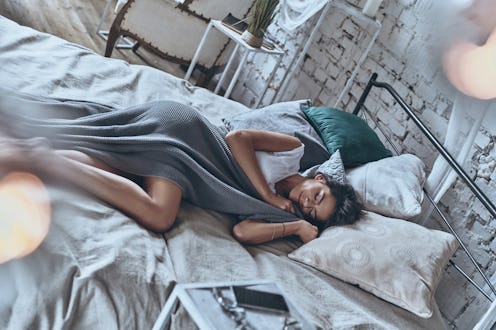(Living)
How To Sleep Better — Even After The Most Stressful Day

For many people, sleep is incredibly elusive. Depending on a ton of different environmental factors, it can be a real struggle to not only fall asleep at a decent hour, but also to stay deeply asleep (without randomly waking up in the middle of the night) enough to wake up with the energy you need to tackle everything on your to-do list — not to mention stay in good health. That's why the search for solutions for getting to sleep fast seems to be never-ending.
If you're one of the many who are on a quest for a better night's sleep, and have already tried such remedies as sleeping apps or luxury bedding to no avail, it may be because you still need to work on reducing anxiety. "With so many distractions in today’s world, whether it’s social media or worrying about an early morning meeting, our minds are always going," explains Poppy Jamie, founder of mindfulness app Happy Not Perfect, who recently collaborated with celebrity sleep coach Nick Littlehales for a breathing and sleep workshop hosted by Breathe Right. "This type of constant stress and anxiety can interfere with our ability to get enough quality sleep."
And as you probably already know, the lack of sleep can mess with everything from your work performance to your relationships, not to mention your physical wellbeing. "Lack of sleep can affect your mood and behavior," Jamie says. "When you don’t sleep well, you may feel more anxious and agitated the next day, or you may notice that you are on edge. And after a period of time, it can lead to general fatigue and feeling burnt out."
That said, it's no wonder why everyone seems to be trying everything they can to get the best sleep possible. And if you're included in that population, there are a few more tips to try that just might be your ticket to sweet sleep serenity, and they're backed by various pros. Read ahead for some unexpected tricks you can implement tonight to achieve a totally restorative rest.
Just Breathe
"While it may sound intuitive, many people overlook the simple power that breathing properly has on quality of sleep," says Jamie, who suggests trying some deep belly breaths as a way of winding down. "Breathing exercises help to take your mind off of the day’s stressors and relax before going to bed," she adds. "Practice taking deep, full breaths through your nose on the inhale, letting your stomach expand, and on the exhale allowing your belly to move towards the spine. Relax your shoulders; and breathe slowly through your nose for five seconds, then exhale slowly for five seconds. Focus on breathing this way for at least 30 seconds or until you feel calm enough to fall asleep."
Additionally, if you struggle with breathing during sleep, try using a breathing strip (like Breathe Right) to open up nasal passages, therefore increasing oxygen and blood flow to give you a deeper, healthier sleep.
Try Acupressure
Ingrid Y. Prueher, certified pediatric and adult sleep and nutrition coach finds that massaging or stimulating certain acupressure points can reduce anxiety before bed. "Hold on to the tips of your big toes to help you become relaxed," she suggests. Keep firm pressure on the point for about two minutes to feel decreased tension almost instantly.
Increase Melatonin
If you've been struggling with sleep, a lack of melatonin could be the culprit. "Melatonin is a hormone produced by a tiny endocrine gland in the brain" Prueher explains. "[It] is produced by the detection of light and dark exposure in the retina of the eye, which helps your circadian rhythm/biological sleep clock in your body." That said, one way to increase your natural supply of melatonin is to get outside and into the daylight — particularly for those whose jobs keeps them primarily indoors during the day. To remedy that, she suggests taking 15 to 20-minute walks a few times a day.
Besides getting out and about, there are certain foods and drinks that induce sleep by targeting the pineal gland, which produces melatonin. Look for foods that include tryptophan, magnesium, calcium and B6, such as leafy greens, almonds, goji berries, and kiwis. As for some drinks to sip before bed, try golden milk (typically a blend of turmeric, dates, black pepper, and nut milk), moringa, valerian tea, and tart cherry juice, all of which Prueher recommends for increasing melatonin.
Get In Sync
Since exposure to daylight is a way of keeping your melatonin production up, syncing up your sleep schedule with those hours can help. "To keep better harmony with your everyday circadian rhythms (sunrise and sunset) and your own internal body clock, you want to optimize exposure to daylight (blue light), diminished light and dark in any 24 hours," notes Littlehales. "Upon waking up in the morning, you need exposure to daylight to trigger key body functions and manage light exposure as the day progresses." And if for whatever reason getting access to that daylight isn't possible, the sleep guru recommends trying daylight therapy devices that can be used indoors, such as the Circadian Optics Lumos 2.0 or Verilux HappyLight Liberty.